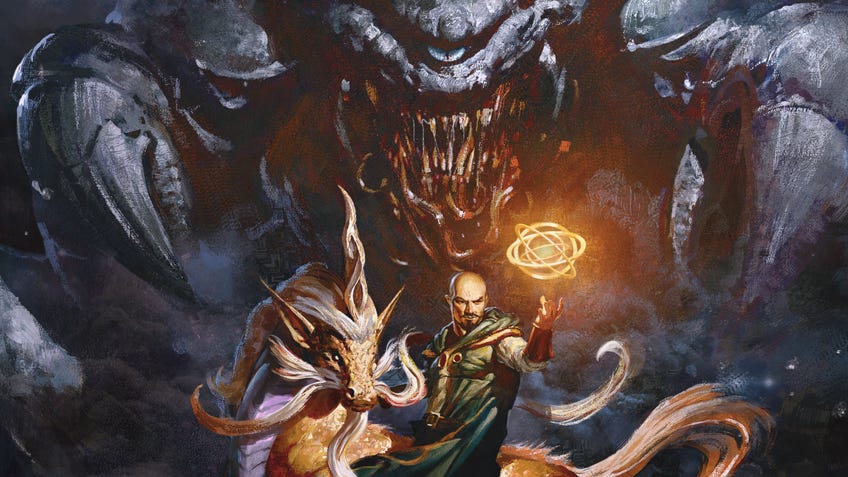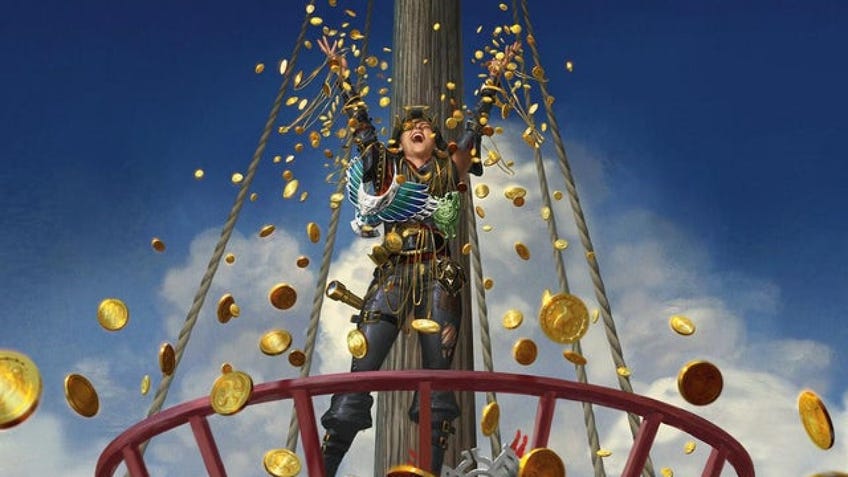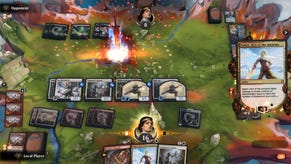“Doubling down on collectibility” of MTG helped Hasbro bank over $1 billion revenue in 2021
Magic: The Gathering’s biggest year to date likely means intensification rather than change.
Toy and entertainment giant Hasbro reported $1.02 billion cash revenue in 2021, making it the first tabletop company to reach those dizzying financial heights. A quarterly earnings call with investors credited Wizards of the Coast and digital games for leading much of its continued growth.
Incoming CEO Chris Cocks presented the report alongside interim CEO Rich Stoddart and CFO Deb Thomas, a transcript of which can be read online here. Wizards of the Coast, which publishes both Magic: The Gathering and Dungeons & Dragons, has recently been lumped together with Hasbro’s digital gaming when reporting sales and income. Digital games include Magic Arena but also newer projects such as the recent Dungeons & Dragons: Dark Alliance video game.
According to the report, traditional tabletop games comprise nearly three quarters of the total combined segment’s revenue compared to the 23% for digital games. That’s not surprising given the relative newness of Hasbro’s efforts to grow their non-physical portfolio beyond maintaining Magic Arena. Dark Alliance might have been met with average reviews, but that apparently hasn’t dissuaded the company from continually reinvesting in future efforts - or at least keeping the cash flows from Arena’s in-game market going strong.
Stoddart specifically mentioned Magic: The Gathering as a major driver for the year’s success. The trading card game reported its best year to date in 2021, topping a similar report in 2020. The pandemic has caused an increase in popularity for plenty of card games and physical pastimes, though Hasbro believes its brand blueprint has also fueled that continued success.
“The consistent growth of Magic [The Gathering] is a testament to the long-term durability of our strategy, led by doubling down on collectability, expanding the Magic product suite to maximise relevance across consumer segments, and giving players exciting and compelling worlds to participate in,” Stoddart said.
The collectability he mentions likely refers to the trend of premium Secret Lairs that feature alternate art, special treatments and guest artists. Wizards of the Coast revealed last year that its Universes Beyond initiative, which allows the creation of cards featuring characters for extant brands such as Warhammer 40K and Lord of the Rings, would heavily take advantage of Secret Lairs. There’s also collector’s booster packs that allow players interested in pulling art treatments, foil cards and special versions meant to be resold for high prices.

The more cynical reading - and one with some precedence - is that this is Hasbro signalling a future push into NFTs. Former CEO Brian Goldner, who passed away in October 2021, told an investor who raised the question of Hasbro’s development in the blockchain-based technology that the company was excited by the possibilities and “are actively developing our opportunity here, and we do see it as substantial”. None of the officers running the presentation explicitly mentioned NFTs, possibly because the public continues to turn on the entire notion as its ostensible promises of decentralised autonomy shake out into little more than financialization schemes. Or, again cynically, investors could be catching wise to public chatter ahead of reveals.
The reality is that players of both Dungeons & Dragons and Magic: The Gathering shouldn't expect the amount of yearly releases to slow, both for core game sets and book as well as collectibles in the vein of Secret Lairs and alternate covers. Even as a growing contingent of fans report release fatigue and feeling overwhelmed by the constant barrage of new stuff, the number of people playing continues to grow.
Cynthia Williams will take over for Cocks as Wizards of the Coast’s CEO on Feb. 25th. Her resume includes 11 years at Amazon and a more recent three-year stint as Microsoft’s general manager and vice president. Her stepping in is likely a move to help the company’s continued push into non-tabletop markets, including more digital games in the future with “AAA budgets” and the upcoming MTG Netflix series and D&D's upcoming film and television franchise hopes.
Update: This article was edited to correctly identify Chris Cocks and Rich Stoddart as incoming and interim CEO, respectively.








